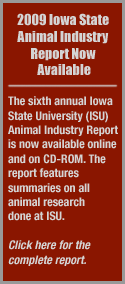NEWS BRIEFS...
A Minnesota-based company, Epitopix LLC, will soon begin to market a vaccine to combat the pathogenic bacteria E. coli O157. While the U.S. Department of Agriculture (USDA) wants additional testing, federal regulators have issued a conditional license allowing Epitopix to start selling the vaccine. It may be available as soon as summer 2009.
The new vaccine is labeled for use in cattle to reduce the prevalence of the E. coli O157 carrier state and for reduction in the amount of E. coli O157 shed in feces to minimize herdmate exposure and infection. The bacteria poses no threat to cattle health. When cattle are harvested, however, E. coli O157 can sometimes find its way into ground beef. Proper cooking easily kills the bacteria, but in cases where beef may be inadequately cooked, serious human disease can occur, especially in children, the elderly or in individuals with a compromised immune system.
A Canadian company, Bioniche Life Sciences, introduced the world's first vaccine against E. coli O157 in cattle. Though available in Canada since 2006, that product has not received approval in the United States.
In spite of a recession, meat sales were surprisingly good during the four-month period from October 2008 through January 2009. According to Meatingplace.com, sales data collected by FreshLook Marketing suggests consumers bought more beef, pork and chicken than during the same period a year earlier. The data suggests trading down to cheaper cuts was common shopping behavior, but total meat purchases increased.
FreshLook Marketing reported its findings during the Annual Meat Conference, March 9-10, in Denver, Colo. The conference is sponsored by the American Meat Institute (AMI) and the Food Marketing Institute (FMI).
According to the report, the volume of total beef retail sales increased by 3.9%, over the corresponding four-month period of a year ago. Sales volume for pork and chicken increased by 3% and 2.4%, respectively.
An increase in the volume of regular ground beef sales (up 6.1%) came as no surprise. However, while regular beef steak purchases sagged a little (down 1%), sales of premium steaks were up by 4.7%. The data and consumer feedback suggest at least some consumers are buying “better”steaks to prepare at home, while restaurant dining declines.
The U.S. Consumer Product Safety Commission, in cooperation with Springfield Wire Inc. and Ritchie Industries, has announced a voluntary recall of tank heaters sold as the “Ritchie Immersion Heater.”Manufactured by Springfield Wire and sold by Ritchie dealers from February 2007 through November 2008, the affected model numbers are 17863 (120-volt/250-watt), 17939 (240-volt/250-watt) and 17940 (240-volt/325-watt).
The recall is based on 44 reports of heater covers that cracked, exposing the heating element to water and creating a shock hazard. Models subject to recall may be returned to the place of purchase for replacement. For more information contact Ritchie at 1-800-747-0222.
Congressional Hearing on Animal ID
The House of Representatives agricultural committee recently held a hearing regarding a proposal to make the National Animal Identification System (NAIS) mandatory. Rep. Collin Peterson (D-Minn.), the House ag committee chairman, complained that little headway has been made in implementing a voluntary system. Peterson suggested the program, as currently structured, would never be effective in providing the country with a reliable traceback system. He called adoption of a mandatory system crucial to avoiding the consequences of a major animal disease outbreak.
Providing testimony on behalf of the National Cattlemen's Beef Association (NCBA), Georgia cattleman Bill Nutt said NCBA supports a voluntary, market-driven approach to animal identification.
“Our industry has serious reservations about a mandatory animal ID program,”Nutt testified. “One of the significant concerns is the confidentiality of producer information that would be held in a USDA database. All data on producers, their land and premises, and their cattle is extremely sensitive, and in many cases proprietary. This is not the type of information that is meant for public disclosure.”
Representing Ranchers-Cattlemen Action Legal Fund, United Stockgrowers of America (R-CALF, USA), veterinarian and cattleman R.M. Thornsberry said no evidence had been presented to prove that existing disease programs are inadequate. Driving NAIS, he suggested, is a desire to conform to international standards for disease management instead of providing diligent effort toward disease prevention. Thornsberry called NAIS “unreasonable and unnecessary.”
The National Pork Producers Council testified in favor of mandatory animal ID, as did the American Veterinary Medical Association (AVMA).
New Rule for Cattle 30 Months and Older
Beef producers requiring the pick-up service of a rendering company may be assessed an extra fee if the critter in question is 30 months of age or older. The fee comes in response to a new Federal Drug Administration (FDA) rule that goes into effect on April 27. It comes as part of the FDA effort to guard against the potential spread of bovine spongiform encephalopathy (BSE).
According to the rule, rendering companies will be required to remove the brain and spinal cord from all cattle ages 30 months or older before materials from such animals can be used to manufacture animal feeds, including pet food. Some processors have complained that compliance is impractical, so they will seek other uses for rendered material from cattle to which the rule applies. Either way, processing costs are likely to increase and rendering companies may want beef producer customers to share the burden.








